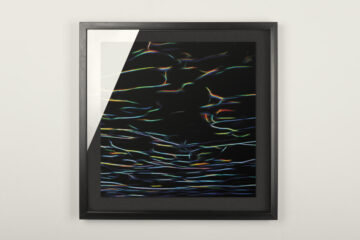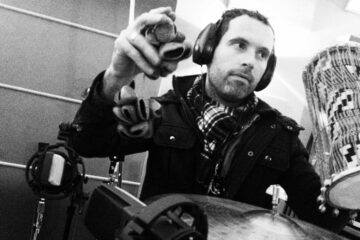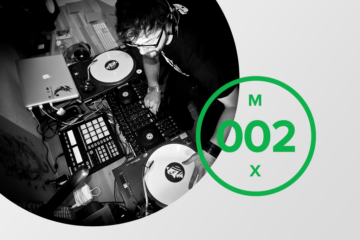Daedelus is by far not a someone who needs to be introduced when it comes to music. Born and raised in Santa Monica, California as Alfred Darlington he studied Jazz at the Thornton School of Music and started his career as a releasing artist started in the early 2000s. Ever since then he has been working on music and been putting out new stuff that will never cease to blow your mind. Daedelus is known for his very own sound that sticks out and can’t be compared to any other piece in the genre. Fusing elements of electronic music with samples that have their origin in the music of the 30s and 40s. Being a part of the critically acclaimed L.A. beat scene and one of the people that surround Flying Lotus under his Brainfeeder imprint he still manages to come up with something new and fresh. With a catalogue that spans over the period of ten years by now he is just about to release his next album Bespoke on Ninja Tune. Recently he was just on a Europe tour with Tokimonsta. Valentin Menedetter met him in Vienna.
Daedelus, the name, he’s this Greek inventor, it’s a myth, his thing is inventing things…
Daedelus: His thing is actually two things, he invents things and then he is quite famous for losing his son. He famously warns Icarus not to fly too high, too close to the sun or the sea and Icarus perishes. So he is famous for his tragedy. His triumph and his tragedy frame him very well and I geek out on that kind of stuff.
Can you relate to that; being an inventor of sound?»Everybody loves music but the dirty secret is, nobody wants to buy it.«
Daedelus
Daedelus: Yeah I think it’s very apropos, it makes a lot of sense nowadays you do your best to bring forth these sounds that are very honest to you and maybe new to the world if you are really lucky you come across something that really feels outside of whatever is fermenting in the music culture and at the same time you are bound to fail because the music industry is terrible, the world we live in – everything has been done. That’s what they tell you; it has all been done. What are you doing why are you making a sound? There is no validity to it, so that’s the tragedy.
Both sides of the character catch you?
Daedelus: Yes totally.
You talked about the music industry and being a part of the music industry is somehow a tragic thing…
Daedelus: Well here is this art, everyone loves music, everyone says they have their favorite artist and they listen to music endlessly. Everything is sound tracked in life. And yet at the same time there isn’t really a way for a musician doing something outside of the norm to necessarily make a living. Thank goodness for downloading, thank goodness for the Internet these are the gifts that make it possible for someone like myself – making this weird sound sometimes, to keep going. Everybody loves music but the dirty secret is, nobody wants to buy it.
Nobody wants to pay for it.
Daedelus: But that’s OK you know, people look at art all the time, people look at architecture all the time. You don’t have to pay to see a building. There is something to that, still people make buildings. We live in music basically; we are constantly surrounded so it’s like architecture; why not be free and say you can enjoy it without paying. Occasionally maybe someone will pay for it to be made.
If I’m right you put out your first record in 2001, we’re now in 2011 and you’ve had a career of ten years.
Daedelus: How crazy. That’s longer than most Hip Hop artists…*
What keeps you going in terms of going on?
Daedelus: Well, we already found out that it is not super money. I’m not rolling and I’m not washing myself in dollar bills. I’m doing this because I really want to. I don’t think anyone would choose music to be especially cool even though it’s nice when strangers can enjoy what you do and I think there are a lot of art forms that include that kind of moment possibly. And that’s gratifying, certainly, but it is not everything. Sometimes you hit these strong moments of Anti as much as you do Pro. The thing is that you have to be very addicted to this music thing to do it. I’m a full addict, not recovering, not going to counseling. I’m in it to win it you know.
You always keep inventing yourself in a new way.»The thing is that you have to be very addicted to this music thing to do it. I’m a full addict, not recovering, not going to counseling. I’m in it to win it you know.«
Daedelus
Daedelus: Well sound wise, but I have particular obsessions, visually that keep me entertained. I mean I wear these sideburns and I wear them very purposeful not only does my wife seem to like them which is a pro, very much very nice that she enjoys them, but also just the fact that they are Victorian, they kinda have this 19th century aesthetic. I thought about getting rid of them, I’ve had them for something like 13 years now and why not, but at the same time they serve their purpose and I still enjoy them. But sound, that stuff is mercurial. Always something new to do, and that’s why the IDM and Hip Hop as which I’m often labeled don’t really fit.
If I pick up on the architecture, being an art form; you talked about free architecture, obviously it’s in the open space it’s in the public – everybody passes by buildings and they are just looking at them, how far can you see an advantage in the concept of free music?
Daedelus: We’re living pretty much there.
Would you put your music out for free?
Daedelus: Well it is out for free, not by my choice necessarily, that’s the world we live in. I have a record coming out in April and it’s out. I mean people are downloading it. It’s available, this thing which makes the whole situation difficult – I’m not complaining. I’m here, I’m playing a show, and I’m able to tour. It’s tough because music is not only a pushing of air, it’s not only the science of it basically, the artistic appreciation is not only the sound that it constitutes and the lyrics. But also it is temporal; it has to be listened to over a certain period of time to get the image of the sound itself. You can’t listen to 15 seconds of a song and think you know the song for instance – you need to listen to three minutes of it or five minutes. A full record is like 50 minutes. When was the last time anyone listened to a record for 50 minutes…
…with no other things…
Daedelus: … no checking your Facebook or looking at your iPad. We live in a very quick amount of time and that’s the problem, cause free music means that people lessen the value of it. By basically getting rid of that filter, you now any filter; money, opinion, whatever it is that keeps you from having millions of gigabytes of music, cause there just isn’t that much time in the day to listen to that properly. I mean the music that I’ve really gone on to love and to cherish and to listen over and over again, I didn’t like the first time I listened to it generally. It took me three or four listens and for whatever reason I was listening to it multiple times. That’s the challenge of free music, that it devalues that moment.









